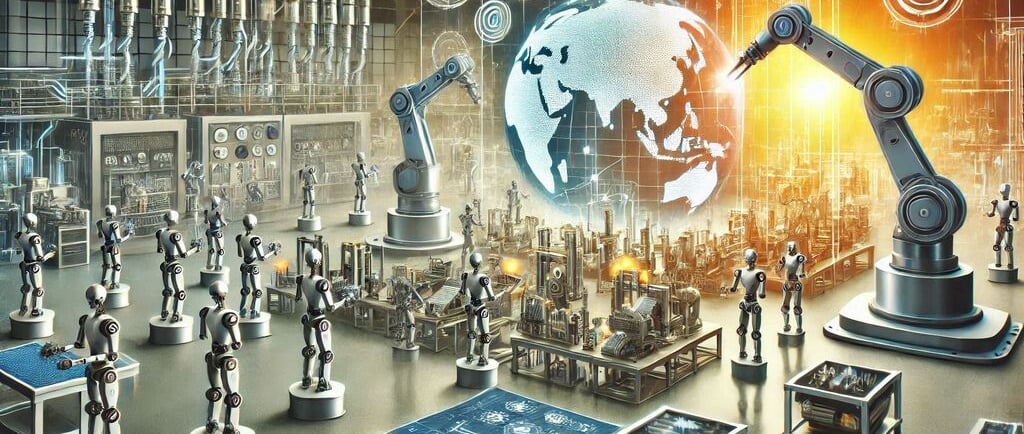Let us collaborate to foster global growth and development together.
How Automation is Revolutionizing Production Machinery Across the Globe
Learn how automation is transforming production machinery worldwide. Discover the benefits, trends, and future impact of automation in manufacturing and production.
10/31/20244 min read


Meta Description:
Learn how automation is transforming production machinery worldwide. Discover the benefits, trends, and future impact of automation in manufacturing and production.
How Automation is Revolutionizing Production Machinery Across the Globe
In today’s fast-paced manufacturing environment, automation is not just a trend; it’s a revolution. Production machinery across the globe is evolving thanks to automation technology, which enhances efficiency, reduces costs, and improves overall product quality. From small-scale manufacturers to multinational giants, automation is reshaping industries and increasing production capabilities in ways that were once unimaginable.
In this article, we’ll dive into how automation is changing production machinery globally, the key benefits of these advancements, and the future outlook of automated manufacturing systems.
The Impact of Automation on Production Machinery
Increased Efficiency and Productivity
One of the most significant advantages of automation in production machinery is the immense boost in efficiency and productivity. Automation allows machines to perform repetitive tasks faster and more accurately than human workers can. As a result, businesses can produce goods in shorter timeframes, reducing lead times and increasing output.
Key Benefits of Automated Production:
24/7 operation: Unlike human workers, machines can operate around the clock without taking breaks, leading to continuous production.
Faster cycle times: Automated systems can complete tasks in a fraction of the time it takes manually, reducing the time needed for assembly, packaging, or testing.
Consistent quality: Robots and automated systems ensure that each product is made with the same precision and quality, minimizing errors or variability.
This boost in productivity means manufacturers can meet higher demand while lowering operational costs and improving their competitive edge in the marketplace.
Reducing Labor Costs and Increasing Safety
Another important reason why companies are embracing automation is its ability to reduce labor costs. With automation, less manpower is needed for labor-intensive tasks like assembling, packaging, and sorting. This shift allows businesses to allocate resources to more strategic areas, such as product innovation or customer service.
Additionally, automation systems significantly improve workplace safety. Hazardous jobs, such as those involving heavy lifting or dangerous chemicals, can now be handled by robots or automated machinery, minimizing human involvement in risky tasks. This reduces the risk of workplace injuries and helps companies comply with stringent safety regulations.
Examples of Safety Enhancements in Automated Factories:
Automated arms and machines that perform heavy lifting or dangerous chemical processes.
Smart machinery with sensors that detect potential malfunctions or hazards before they cause accidents.
Trends Driving Automation in Production Machinery
The Rise of AI and Machine Learning
Artificial intelligence (AI) and machine learning are playing a major role in the automation of production machinery. These technologies allow machines to not only perform tasks but also make decisions based on real-time data and insights. AI-driven production systems can analyze trends, adjust processes, and optimize performance without human intervention.
How AI is Revolutionizing Manufacturing:
Predictive maintenance: AI systems can predict when a machine will need repairs or maintenance, helping avoid costly downtime.
Quality control: Machine vision and AI algorithms can automatically inspect products for defects, ensuring a higher level of quality.
Flexible production: AI-powered systems can quickly adapt to changes in production requirements, making them more versatile in fast-paced environments.
The rise of AI in manufacturing also leads to smarter automation, where machines are not just following preset instructions but learning and improving based on their environment and experience.
Industry 4.0: Smart Factories and the Internet of Things (IoT)
Industry 4.0 refers to the fourth industrial revolution, which connects automated systems through the Internet of Things (IoT). This development allows production machinery to communicate with one another in real-time, facilitating seamless production and reducing inefficiencies across the supply chain.
Key Features of Smart Factories:
Connected machines: Automated machines exchange data with each other and central systems, optimizing operations and real-time decision-making.
Remote monitoring: Operators can monitor production remotely, receiving real-time data on equipment performance, stock levels, and quality control.
Data-driven insights: IoT devices gather data, which can be analyzed to further improve processes and reduce costs.
By integrating IoT and automation, manufacturers can achieve more flexible and efficient production systems, better understanding their production lines and making adjustments with minimal human intervention.
How Automation is Reshaping Global Production
Cost-Effective Manufacturing Solutions for Smaller Businesses
As automation technology becomes more affordable, even small manufacturers and startups are starting to incorporate automation into their production processes. The cost of entry for automated machinery is lowering, making it accessible for a larger segment of the industry. Small businesses can now compete with larger players by offering quicker turnarounds, improved product quality, and reduced operating expenses.
Examples of Automation for Small Businesses:
Automated packaging systems designed for smaller batches.
Low-cost collaborative robots (cobots) that assist with assembly tasks alongside human workers.
Automation has become an equalizer, enabling companies of all sizes to improve productivity and maintain a competitive edge.
Global Supply Chain Optimization
Automated production machinery plays a pivotal role in the efficiency of global supply chains. With smarter machines, manufacturers are able to align their production timelines with market demand, improving inventory management and reducing waste.
Impact of Automation on Global Supply Chains:
Improved forecasting: Automated systems can gather and analyze data on global supply chain trends to predict future demands.
Quicker delivery: With faster production cycles and streamlined processes, products can be delivered to markets more quickly.
These efficiencies help businesses better manage global operations while responding quickly to changes in consumer preferences or disruptions in supply chains.
Looking Toward the Future of Automation in Production Machinery
As automation technology continues to advance, its impact on production machinery will only become more profound. We can expect to see even more sophisticated systems powered by AI, IoT, and machine learning. Moreover, innovations such as 3D printing and robotics will play an increasingly important role in creating customized products faster and more affordably than ever before.
For manufacturers, the future lies in adopting these innovations to remain competitive and agile. The businesses that can implement smart automation systems into their production processes will be better positioned to thrive in an increasingly demanding global marketplace.
Conclusion
Automation is undoubtedly revolutionizing production machinery across the globe. From increased efficiency and labor savings to the rise of smart technologies like AI and IoT, these advancements are transforming industries at a rapid pace. Businesses, both large and small, are already reaping the benefits, which include enhanced safety, improved quality, and better customer satisfaction.
As the world of manufacturing continues to evolve, embracing automation is no longer optional but a necessity for growth. Are you ready to invest in the future of your production machinery? Explore how automation can streamline your processes and take your business to the next level.
Engage with Us: What automated production systems have worked best for your business? Share your experiences in the comments below!
Innovation
Cutting-edge solutions for industrial efficiency and productivity.
© 2024. All rights reserved.


